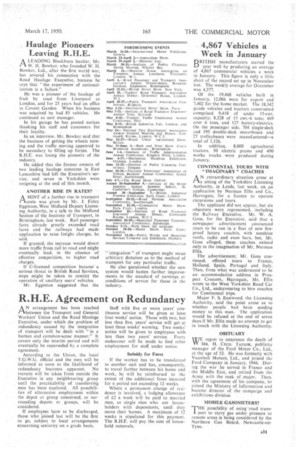. Haulage Pioneers Leaving R.H.E.
Page 33

If you've noticed an error in this article please click here to report it so we can fix it.
A LEADING Blackburn haulier, Mr. In. W. H. Bowker, who founded W. H. Bowker, Ltd., after the first world war, has severed his connection with the Road Haulage Executive, because he says that "the experiment of nationalization is a failure."
He was a pioneer of the haulage of fruit by road from Liverpool to London, and for 25 years had an office in Covent Garden When his business was acquired he had 85 vehicles. He continued as unit manager.
In his garage he has posted notices thanking his staff and customers for their loyalty. • In an interview, Mr. Bowker said that the business of getting the wheels turning. and the traffic moving appeared to be secondary to filling up forms. The R.H.E. was losing the pioneers of the industry. He.ackied that the former owners of two leading haulage concerns in East Lancashire had left the Executive's service, and seven in Yorkshire were resigning at the end of this month.
ANOTHER RISE IN RATES1k
A HINT of a further rise in transport rIcosts was given by Mr. J. Foley Egginton, West Midland Deputy Licensing Authority, in a talk to the Midland Section of the Institute of Transport, in Birmingham, last week. Rail passenger fares already greatly exceeded -road fares and the railways had made application to raise freight charges, he said.
If granted, the increase would divert more traffic from rail to road and night eventually lead, in the absence of effective competition, to higher road charges.
If C-licensed competition became' a serious threat to British Road Services, steps might be taken to restrict the operation of ancillary users' vehicles.
Mr. Egginton suggested that the "integration" of transport might mean arbitrary dictation as to the method of transport for any particular traffic.
He also questioned whether the new system would hasten further improvements in the standard of earnings or conditions of service for those in the industry.




























































































